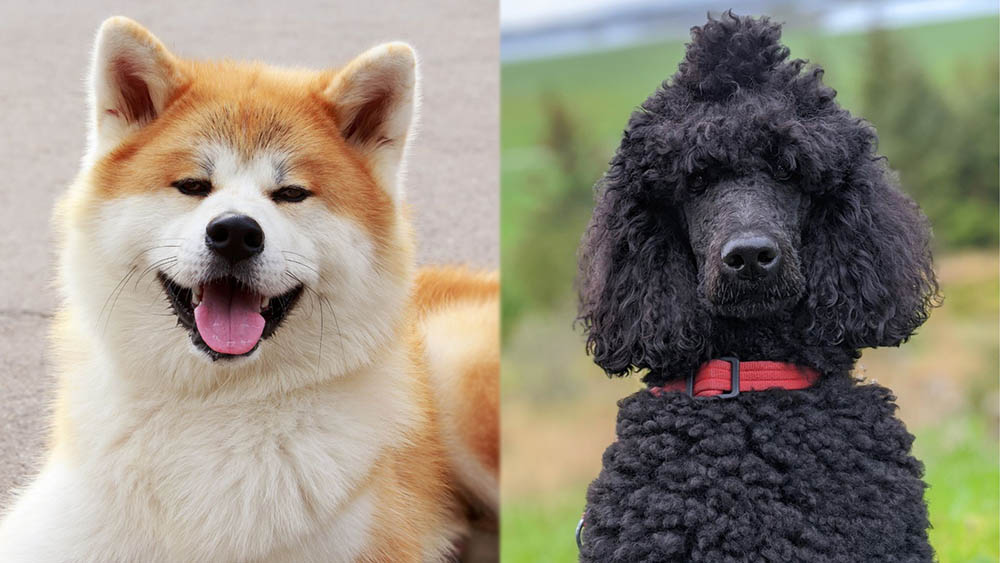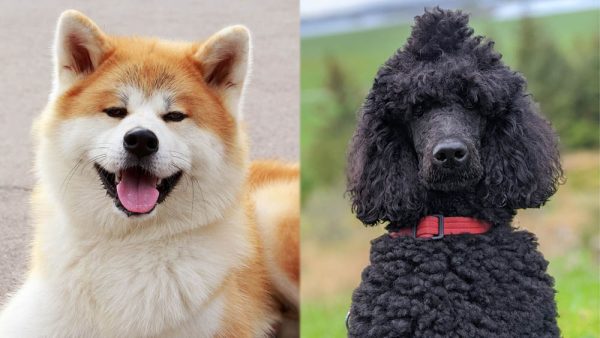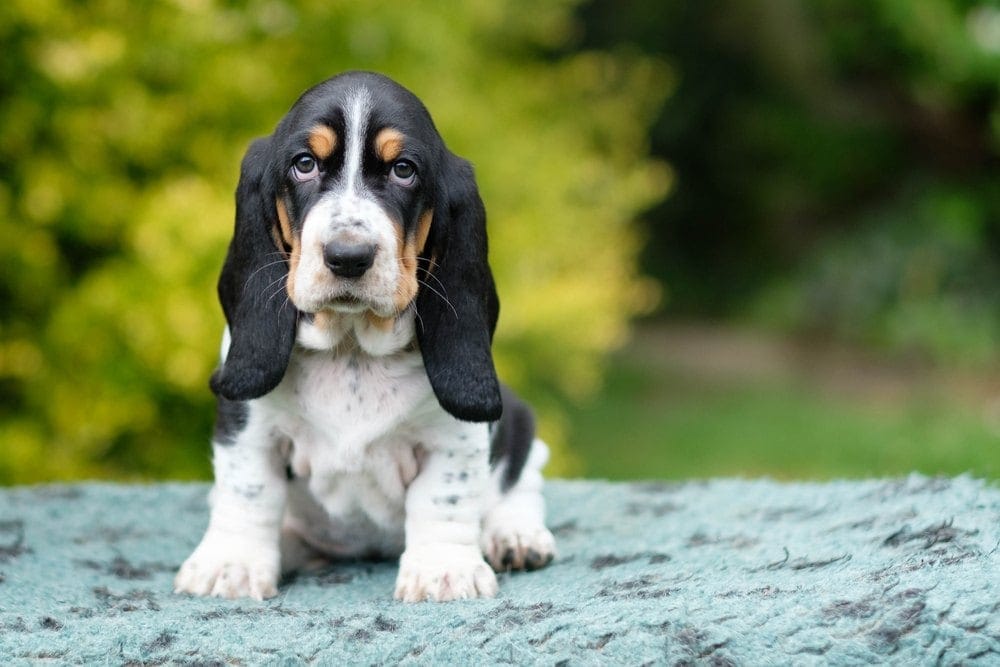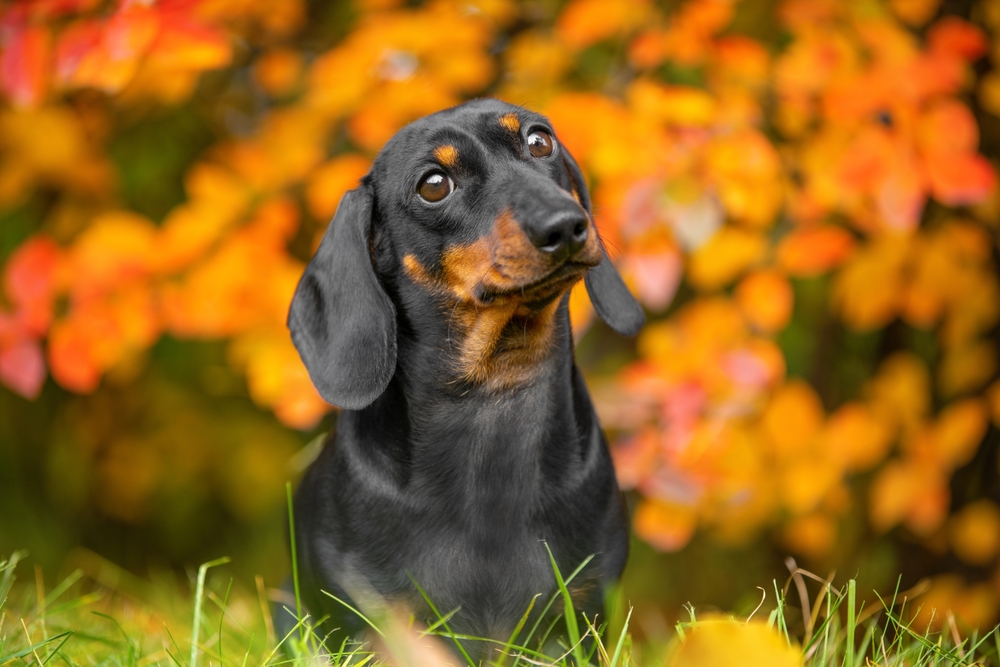Click Below to Skip Ahead
We don’t know exactly when the Aki-Poo came to be. The cross undoubtedly came on the wave of many so-called designer breeds in the late 1980s alongside breeds like the Labradoodle. However, we do know that the Akita’s history goes back 10,000 years to Japan, where the breed is even considered a national monument. Few dogs can claim such a status.
The Poodle also has national recognition in France, while the breed originated in Germany. Interestingly, both were selectively bred as hunting dogs. This breed was more at home in the water, flushing waterfowl and other game. The Poodle Club of America and the American Kennel Club (AKC) recognize three size classes: standard, miniature, and toy. The Aki-Poo includes the Standard Poodle.
Breed Overview
Height:
15–28 inches
Weight:
40–120 pounds
Lifespan:
12–15 years
Colors:
Black, brown, red, fawn, white
Suitable for:
Active families looking for a loyal watchdog
Temperament:
Loyal, intelligent, affectionate, proud
Both breeds are highly intelligent. The Poodle is an active dog, whereas the Akita is intense. Those traits made them well-suited to their respective roles as hunting companions. It also shows up in various aspects of the Aki-Poo’s personality and temperament.
Aki-Poo Characteristics
Aki-Poo Puppies
We must preface the Aki-Poo’s profile by saying this pup isn’t the best choice for a novice pet owner. Canine intelligence can make a dog easy to train. However, it also brings the challenge of adequate mental stimulation into the mix. It’s also essential to consider the size of the adult. While the Poodle is lanky, the Akita is a powerful and muscular animal. Proper training is imperative with this dog.
Despite their large size, the Aki-Poo doesn’t respond well to punishment. Remember that this pup is loyal almost to a fault. Nevertheless, they are independent dogs, which comes from hunting, where they might be on their own for a while. If the Akita is dominant, your pet won’t tolerate heat well, especially if they inherited the breed’s thick double coat. It could also make grooming more challenging.
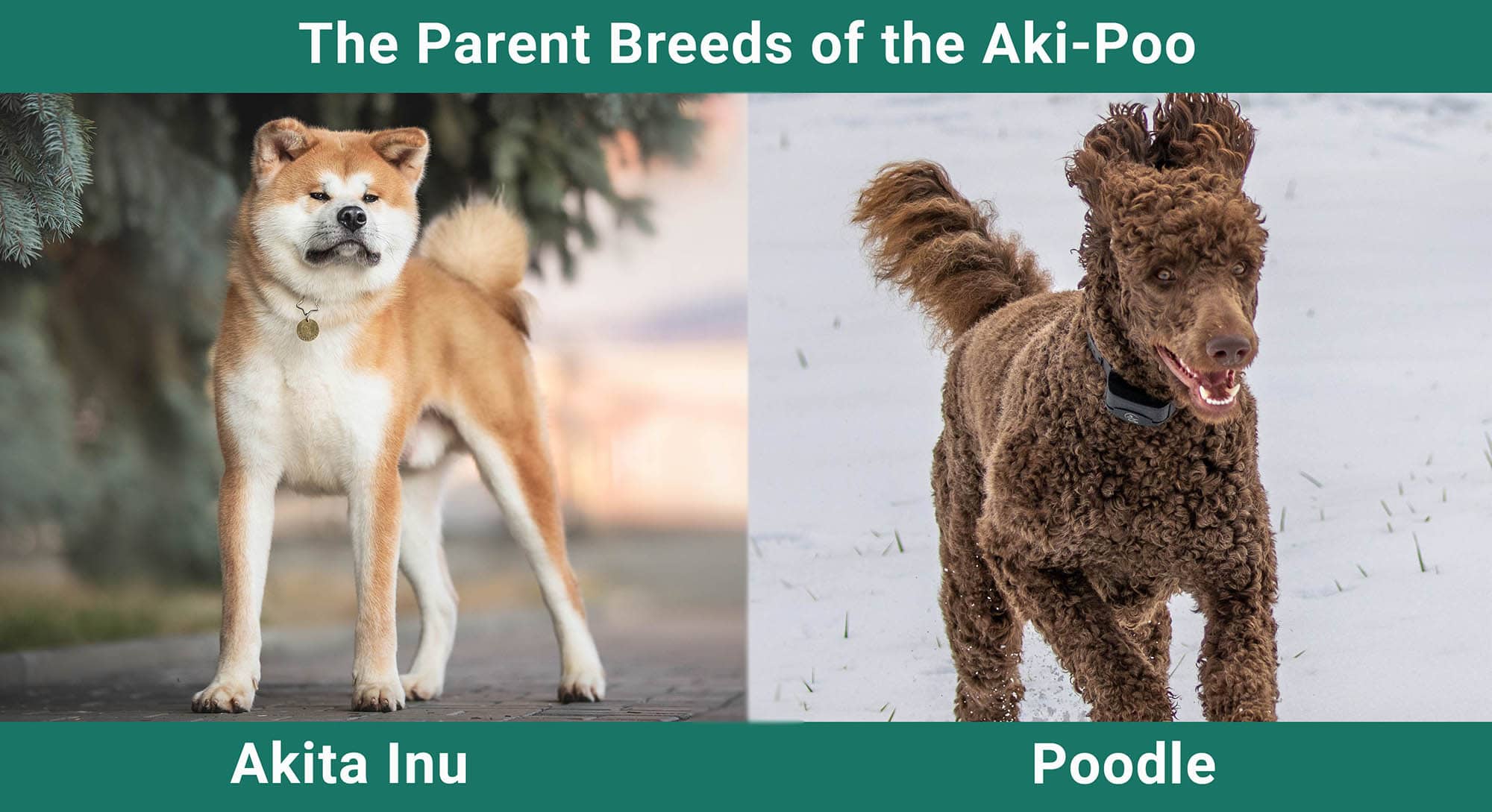
Temperament & Intelligence of the Aki-Poo
The intelligence of the Poodle motivated many enthusiasts to tap into this trait when deciding on the breeds for mixes. According to author Stanley Coren, the Poodle is the second most intelligent breed, topped only by the Border Collie. It’s the proverbial double-edged sword. It’s great if you want to teach your pup some tricks, but it can be a burden since you must provide daily mental stimulation.
Walks and play dates at the doggie park can help satisfy this need for enrichment. However, it also means regular interaction with your Aki-Poo to keep them from getting bored. This pup has the strength that the Akita brings to the mix. Remember that a bored dog is a destructive one.
Are These Dogs Good for Families?🧑🧑🧒
The Aki-Poo can make an excellent family pet. The pup will thrive in an active household. They prefer the company of their family members to being alone. We recommend teaching young children to respect their pet’s space. You should also supervise playtime. The Aki-Poo can be nippy and may also not tolerate roughhousing well.
Does This Breed Get Along with Other Pets?
We recommend the Aki-Poo in households where they are the only pet. The Akita in the mix may not handle other dogs well, particularly ones of the same sex. This breed also has a strong prey drive and will likely chase a cat or other animal that runs from them. It’s an instinctive behavior that may be challenging to curb.
Things to Know When Owning an Aki-Poo:
Every dog has their quirks and issues with unwanted behavior. It’s best to know what they are upfront. Akitas are loyal to their family but less welcoming to strangers. After all, the breed has a history as a watchdog. The Poodle is endearing but can also be vocal. That’s not unusual when you consider their role in hunting. So, what else do you need to know about this breed?
Food & Diet Requirements🦴
The Aki-Poo can become a large adult. Therefore, we suggest requesting to see the parents and possibly your pup’s littermates to give you an idea of the size of your pet. You should give your dog a commercial diet appropriate for the animal’s life stage. You should also stick to dog food formulated for large breeds. Small and large canines mature at different rates. Thus, the various diets differ.
You should feed a puppy between three to four times daily as per the instructions on the dog food label. Make sure plenty of fresh water is available. We recommend not using elevated bowls or only giving only one meal daily because of the parent breeds’ risk of bloat. Adults should get two meals.
Exercise🐕
Both parent breeds are active dogs that like to run and play. The Aki-Poo is no exception. Daily walks will provide the necessary mental stimulation for your pup. It can also help keep your pet’s weight in check, although obesity isn’t very common if fed properly. You should supervise your pooch’s time outside, even if you have a fenced-in yard. The Aki-Poo has a moderate wanderlust potential.
Training🎾
You should begin training your Aki-Poo as soon as possible. The dog’s intelligence will help on that score. We also suggest working on your pup’s leash manners early. Exposing your pet to novel things and situations at an early age can help prevent aggression and fearfulness in adults. It can also help your pet become more stranger-friendly.
Grooming ✂️
One of the desirable traits of Poodles is their low shedding. However, the Akita is a different story. Therefore, it’s up to genetics. Screening is available for Poodles but not Akitas. The degree of shedding could vary even within litters. Weekly grooming will ensure your pet’s coat is looking its best. It’s also another bonding opportunity. We suggest routinely checking your dog’s nails and ears.
Health and Conditions🏥
The Akita and Poodle are generally healthy breeds. Both are susceptible to bloat, a potentially fatal condition. We recommend being alert for the warning signs, such as panting and unproductive vomiting. The Aki-Poo is also susceptible to joint issues, like hip dysplasia. Reputable sellers will test their breeding stock for this painful condition. We strongly urge you to ask about health screenings before buying.
- Sebaceous adenitis
- Cataracts
- Thyroid disorders
- Bloat
- Hip dysplasia
- Idiopathic epilepsy
Male vs. Female
Male and female Aki-Poos can make delightful pets with the proper training and socialization. Environmental factors often have the strongest influence on a dog’s personality. A stark size difference exists with both parent breeds, which may affect your decision for one sex over the other. A large male dog will be a formidable deterrent if you’re looking for a guard dog.
3 Little-Known Facts About the Aki-Poo
1. Your Aki-Poo May Have a Spotted Tongue
You probably know that Chow Chows have a blue tongue. The Akita is related to this breed. Consequently, it also has a spotted tongue with some extra pigment. Scientists don’t know why or how this characteristic occurred. However, it’s one more unique trait of this lovable dog. Interestingly, polar bears and giraffes also have blue tongues.
2. Helen Keller Is Responsible for Akitas Being in America
Despite the breed’s long history, the dog wasn’t well known outside Japan. When Helen Keller visited the country, she was gifted an Akita in 1937. It didn’t take long before this pup endeared itself to enthusiasts. The rest, they say, is history.
3. The Poodle Is Part of AKC’s Non-Sporting Group
It seems odd that a dog as intelligent and trainable as the Poodle should belong to this group. After all, the pup has had many jobs, including hunting companion, circus performer, watchdog, and service animal. Undoubtedly, the breed’s association with all things fancy may have played a role.
Final Thoughts
The Aki-Poo is an interesting mix that brings some exciting qualities to the table. Intelligence and an active dog are high on the list. This pup is an excellent choice for active families who can ensure they get the love and attention they need. They aren’t pets to leave home alone all day long. This pooch needs interaction with their family to nurture the loyalty of the parent breeds.
You may find it challenging to locate an Aki-Poo. However, in the right household, it’ll be worth the effort. You couldn’t ask for a more loyal pet.
See Also:
- Akita Chow Mix: Care, Pictures, Info & More
- Dalmadoodle (Dalmatian Poodle Mix): Care, Pictures, Info & More
Featured Image Credit: (L) Olga Aniven, Shutterstock | (R) Hans Ole Benonisen, Unsplash

